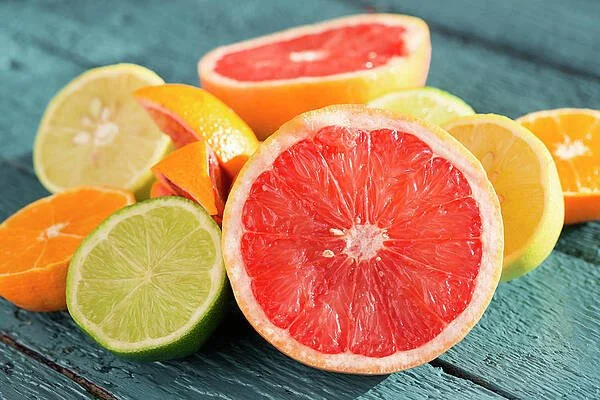Citrus Storage Secrets: To Chill or Not to Chill?
Imagine the excitement as you open your latest delivery from us. The vibrant oranges, sunny lemons, zesty limes, and blushing grapefruits promise a burst of flavour and vitamin C. As you lift each fruit, inhaling its fresh aroma, a question arises: should these juicy gems find a home in your refrigerator or on your countertop?
In this comprehensive guide, we'll peel back the layers on citrus storage, exploring the best practices for keeping your oranges, lemons, limes, grapefruits, and other citrus fruits at their peak of freshness. Whether you're a culinary enthusiast eager to make the most of your The Épicerie delivery or simply looking to extend the life of your citrus haul, get ready to discover the zesty secrets of citrus storage!
To Refrigerate or Not to Refrigerate?
As you unpack your L'Épicerie citrus box, you might wonder about the best way to store each type of fruit. The answer isn't as straightforward as you might think. Let's break it down by fruit:
Oranges
Short-term storage (1 week or less): Room temperature is fine
Long-term storage: Refrigerate
Oranges can last up to two weeks in the refrigerator, compared to about a week at room temperature.
Lemons and Limes
Short-term storage: Room temperature works well
Long-term storage: Refrigerate
When refrigerated, lemons and limes can last up to a month, versus just a week or two at room temperature.
Grapefruits
Short-term storage: Room temperature
Long-term storage: Refrigerate
Grapefruits follow the same pattern as oranges, lasting about two weeks in the fridge.
Other Citrus (Mandarins, Clementines, Tangerines)
Short-term storage: Room temperature
Long-term storage: Refrigerate
These smaller citrus fruits tend to dry out faster, so refrigeration is recommended for storage beyond a few days.
[Suggested image: Infographic showing storage times for different citrus fruits]
Best Practices for Citrus Storage
Keep them dry: Moisture can lead to mould growth, so store your citrus fruits in a dry environment.
Allow for air circulation: Don't store citrus in airtight containers or plastic bags, as this can trap moisture.
Check regularly: Remove any fruits that show signs of mould to prevent it from spreading.
Wash before use: Only wash your citrus fruits right before you plan to use them.
Room temperature for best flavour: If you plan to eat your citrus within a week, keeping them at room temperature will ensure the best flavour and juiciness.
Health Benefits of Citrus
Citrus fruits aren't just delicious; they're packed with nutrients too! Here's what you typically get in a medium-sized orange (about 130g):
Calories: 62
Carbohydrates: 15g
Fibre: 3g
Vitamin C: 93% of the Daily Value (DV)
Thiamine: 11% of the DV
Folate: 10% of the DV
Potassium: 6% of the DV
Key Benefits:
Vitamin C Boost: Supports immune function and acts as a powerful antioxidant.
Fibre for Digestive Health: Aids in digestion and helps maintain a healthy gut.
Rich in Flavonoids: These compounds have anti-inflammatory and antioxidant effects.
Hydration: Citrus fruits have high water content, contributing to overall hydration.
Studies suggest that regular consumption of citrus fruits may help reduce the risk of heart disease, certain types of cancer, and kidney stones.
From Tree to Table: Citrus Salad Recipe
Here's a refreshing citrus salad that showcases the vibrant flavours of various citrus fruits:
Ingredients:
2 oranges
1 grapefruit
2 clementines or mandarins
1 lime (for juice)
1 tablespoon honey
Fresh mint leaves
Optional: 2 tablespoons pomegranate seeds
Instructions:
Peel and segment the oranges, grapefruit, and clementines.
Arrange the segments on a plate.
Mix lime juice and honey to create a dressing.
Drizzle the dressing over the fruit.
Garnish with fresh mint leaves and pomegranate seeds (if using).
Chill for 15 minutes before serving.
Frequently Asked Questions
Can I freeze citrus fruits? While you can freeze citrus, the texture will change upon thawing. It's best to freeze the juice or zest instead.
How can I tell if a citrus fruit has gone bad? Look for soft spots, mould growth, or an off smell. If the fruit feels unusually light, it may have dried out.
Is it safe to eat citrus with green patches on the skin? Yes, this is often just chlorophyll remaining in the skin and doesn't affect the fruit's quality.
Can I store cut citrus in the refrigerator? Yes, but wrap it tightly in cling film or store in an airtight container and use within 2-3 days.
Do citrus fruits continue to ripen after being picked? Unlike some fruits, citrus does not continue to ripen after harvesting.
From the sunny groves to your kitchen, citrus fruits bring a burst of flavour and nutrition to our lives. By understanding the best storage practices for each type of citrus, you can ensure that every slice, squeeze, and zest is at its peak of freshness.
Whether you're tossing segments into a salad, squeezing fresh juice for your morning routine, or zesting a lemon for your favourite recipe, proper storage will help you make the most of these versatile fruits. Remember, for short-term enjoyment, let your citrus bask in room temperature glory, but for long-term freshness, the refrigerator is your friend.
So, are you ready to elevate your citrus game? Head to your fruit bowl or fridge and give your citruses the TLC they deserve. Your taste buds (and your body) will thank you!
What's your favourite way to enjoy citrus fruits?
From The Epicerie with love



